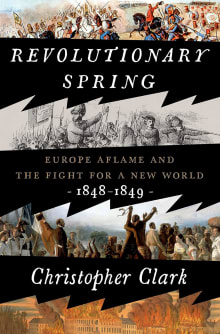
❤️ loved
this book because...
A radical rethinking of all our political assumptions. In 1848 one world began to end and another begin. In 2024 we might say the same.
-
Loved Most
🥇 Teach 🥈 Immersion -
Writing style
❤️ Loved it -
Pace
🐇 I couldn't put it down
2 authors picked Revolutionary Spring as one of their favorite books, and they share why you should read it.
A Telegraph, Sunday Times, Economist and TLS Book of the Year
'One of the best history books you will read this decade' History Today
An exhilarating reappraisal of one of the most dramatic years in European history, from the acclaimed author of The Sleepwalkers
There can be few more exciting or frightening moments in European history than the spring of 1848. Almost as if by magic, in city after city, from Palermo to Paris to Venice, huge crowds gathered, sometimes peaceful and sometimes violent, and the political order that had held sway since the defeat of Napoleon simply collapsed.
Christopher…







